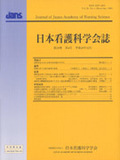Japanese
English
- 販売していません
- Abstract 文献概要
- 参考文献 Reference
- サイト内被引用 Cited by
要旨
Time Trade-Off(TTO)法は,HRQOLを総体的に測定する方法のひとつである.
TTO法により,糖尿病患者を生存期間が短くなるが病気のない健康な状態で過ごしたい交換者,現在の糖尿病の状態のまま今後も過ごしたい非交換者に分けた時,前者にHRQOLの評価は低い.
目的:交換者になる確率を上昇させる要因を検討することである.
方法:112名の糖尿病患者から研究の同意を得た.TTO法と質問紙法を用いた.
結果:1) TTO法の結果,糖尿病患者で42名(37.5%)が交換者で,70名(62.5%)が非交換者であった.2) 13項目からなる質問紙を用いて,糖尿病と治療法の患者の日常生活に与える否定的な影響を因子分析法を用いて検討した結果,「活動制限による孤独感」「病状悪化による精神的負担」「病気による可能性のない将来」「食事療法による精神的負担」の4因子が抽出された.3) ロジスティック回帰分析の結果,「病状悪化による精神的負担」「食事療法による精神的負担」の2因子,「身体的自覚症状がある」は交換者になる確率を上昇させる要因であった.
結論:交換者において,病状悪化や食事療法に対する精神的負担の軽減,身体的自覚症状の軽減などの援助の必要性が示された.今後は,これら3要因と非交換者との関係を検討したい.
Abstract
The Time Trade-Off (TTO) Method is one of the generic instruments in the measurement of HRQOL.When diabetic outpatients are divided into 2 groups by the TTO method, evaluation of HRQOL in diabetic outpatients who would wish to trade their remaining life with disease (diabetic state) for a shorter life without disease (Trade-off Group) is lower than that of the patients would not wish to trade (Non Trade-off Group).
Aims:These aims are to investigate which factors are significantly associated with the high probability of increasing the number of diabetic outpatients that composes Trade-off Group.
Methods:One hundred and ninety seven diabetic outpatients participated in this study after they signed the informed consent form. The questionnaire and the TTO method were used.
Results:1) On results of the TTO method, Trade-off Group was composed of 42 patients (37.5%), Non-Trade-off Group was composed of 47 patients (62.5%). 2) On diabetes and the treatment have an negative effect on daily life of diabetic outpatients;The principal-component factor analysis with Varimax rotation was applied to date of 112 patients for 14 items, and 4 factors were separated out. 4 factors were named:loneliness factor from restricted social activities(factor 1), getting worse factor(factor 2), hopeless future factor from physical and psychological troubles in daily life with diabetes(factor 3), and negative feelings factor from severe diet control(factor 4). 3) Results of Logistic regression analysis;Getting worse, having negative feelings from severe diet control and physical symptoms were significantly associated with the high probability of increasing the number of diabetic outpatients that composes Trade-off Group.
Conclusions:These results clearly show the necessity to provide more supportive care in their physical and psychological fields for Trade-off Group. The next problem would be to investigate the relation between these 3 factors (getting worse, having negative feelings from severe diet control and physical symptoms) and Non-Trade-off Group.
Copyright © 2008, Japan Academy of Nursing Science. All rights reserved.


